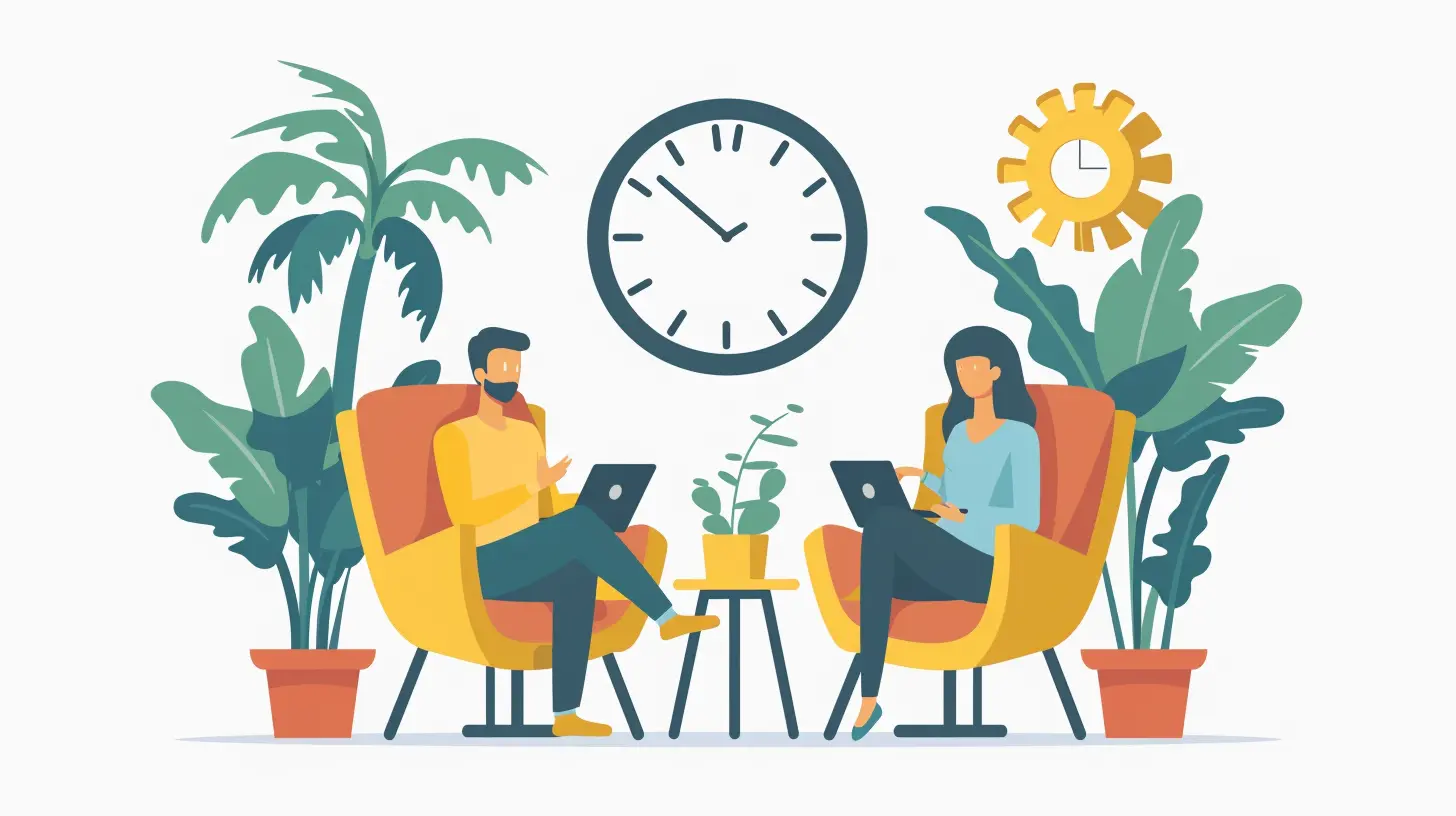19 February 2025
In today's fast-paced world, where technology keeps us constantly connected, the line between work and personal life has become increasingly blurred. Many of us find ourselves answering work emails late at night, taking business calls during family dinners, or stressing over deadlines while we're supposed to be on vacation. Does any of this sound familiar?
The truth is, while it might feel like you're being productive, this constant juggling act can take a significant toll on your mental health. In fact, achieving a healthy work-life balance is crucial for maintaining not just your professional performance but also your emotional and psychological well-being.
In this article, we’ll dive into why work-life balance is so important for your mental health, how it can affect various areas of your life, and strategies you can implement to regain control. Let’s get started!

What Exactly Is Work-Life Balance?
Before we explore its importance, let’s clarify what we mean by "work-life balance."Work-life balance refers to the ability to maintain a healthy equilibrium between your professional responsibilities and personal life. It’s about juggling work demands while still having time for relationships, hobbies, self-care, and relaxation. Sounds easy, right? But in reality, it can be a tough nut to crack.
In essence, work-life balance is about ensuring that both "work" and "life" receive the time and attention they deserve without one overshadowing the other. When this balance is skewed—either because you're overworking or neglecting your personal needs—stress and burnout can creep in, wreaking havoc on your mental health.

The Link Between Work-Life Balance and Mental Health
So, why is work-life balance so crucial for your mental health? Here are a few reasons:1. Reduced Stress Levels
One of the most immediate benefits of maintaining a healthy work-life balance is a reduction in stress. When you're constantly "on" at work, your body stays in a state of heightened alert. This can lead to chronic stress, which—left unchecked—can have serious consequences for both your physical and mental health.A balanced schedule allows you to take breaks, recharge your mental batteries, and return to work with a fresher mindset. Think of it like recharging your phone; if you never plug it in, it's going to shut down eventually. The same goes for your mental health.
2. Improved Relationships
When you're overworked, your personal relationships often take a backseat. You may find yourself too tired to engage in meaningful conversations with loved ones, or too distracted to enjoy quality family time. Over time, this imbalance can strain relationships and lead to feelings of isolation or guilt.On the flip side, when you make time for the people who matter, you're likely to feel more connected and supported. Social connections are like the safety net for your mental health, and without them, you might feel like you're walking a tightrope with no backup.
3. Prevention of Burnout
Burnout is a state of emotional, physical, and mental exhaustion caused by prolonged stress—often related to work. Signs of burnout include feelings of helplessness, detachment, and a lack of motivation. If you’ve ever reached a point where you just can’t muster the energy to care about work anymore, you’ve experienced burnout.By maintaining a healthy work-life balance, you're less likely to experience burnout because you're giving yourself the mental and emotional space to recover from day-to-day stressors.
4. Better Physical Health
Believe it or not, poor work-life balance can also affect your physical health. Chronic stress can lead to conditions such as high blood pressure, heart disease, and digestive issues. Not to mention, when you’re overworked, you might also neglect exercise, sleep, and proper nutrition—all of which are essential for maintaining both your physical and mental health.A well-balanced life gives you the time and energy to focus on self-care activities, such as working out, eating a balanced diet, and getting enough sleep—all of which are integral to both physical and mental well-being.
5. Increased Productivity and Creativity
Contrary to popular belief, working more hours doesn’t necessarily make you more productive. In fact, overworking can actually reduce your productivity. When you're mentally drained, it’s harder to concentrate, come up with creative solutions, or even complete simple tasks efficiently.Taking time away from work allows your brain to reset, making you more effective when you return. It’s like giving your computer a reboot—it runs faster and smoother afterward.

How to Achieve a Healthy Work-Life Balance
Now that we’ve established the importance of work-life balance, how can you achieve it? Here are some practical tips to help you get there:1. Set Boundaries
One of the most effective ways to maintain a work-life balance is by setting clear boundaries between your work and personal life. This can be easier said than done, but it’s crucial for your mental health. For example, try not to check work emails after a certain hour or during weekends. Train yourself to mentally "clock out" and focus on your personal life once you leave the office (or close your laptop if you're working from home).2. Prioritize Self-Care
Self-care isn't selfish—it’s necessary for your mental health. Whether it’s going for a walk, reading a book, or practicing meditation, make sure you carve out time for activities that help you relax and recharge. Self-care acts as a buffer against stress and gives you the emotional resilience to handle life's challenges.3. Learn to Say No
It can be tempting to say "yes" to every work opportunity that comes your way, especially if you're driven or ambitious. But constantly taking on new projects or responsibilities can quickly lead to burnout. Learn to evaluate your workload and say no when necessary. Think of it as protecting your future self from unnecessary stress.4. Take Regular Breaks
It’s easy to get caught up in the grind and forget to take breaks. However, research shows that taking short, regular breaks throughout the day can boost your productivity and improve your focus. Whether it's a 10-minute walk around the block or a quick stretch at your desk, breaks are essential for preventing mental fatigue.5. Unplug from Technology
In today's digital age, it's all too easy to stay connected to work 24/7. But constantly checking in on work via your phone or laptop can make it difficult to truly "shut off" and relax. Try designating tech-free periods during your day, such as during meals or an hour before bed. You’d be surprised how much mental clarity you gain when you’re not constantly bombarded by notifications.6. Delegate and Ask for Help
It’s okay not to do everything yourself. If you’re feeling overwhelmed, don’t hesitate to delegate tasks to others. Whether it’s at work or at home, there’s no shame in asking for help. Delegation not only lightens your load but also allows you to focus on tasks that are more important or fulfilling.7. Schedule Downtime
Just like you schedule meetings or work tasks, make sure to schedule downtime. Pencil in time for relaxation, hobbies, or spending time with loved ones. By treating downtime as a non-negotiable part of your day, you’re more likely to stick to it.8. Seek Professional Help
If you're struggling to achieve work-life balance and it's affecting your mental health, don't hesitate to seek professional help. A therapist or counselor can provide you with strategies to manage stress, set boundaries, and prioritize your well-being.
The Consequences of Ignoring Work-Life Balance
When you ignore the need for a work-life balance, the consequences can be far-reaching. Here are some of the negative outcomes you might face:- Chronic Stress: Constantly being in "work mode" can lead to chronic stress, which can affect your physical health, relationships, and overall quality of life.
- Decreased Job Satisfaction: When you're burned out, you're less likely to enjoy your work, which could lead to dissatisfaction or even quitting your job.
- Health Issues: Poor work-life balance can contribute to a host of health problems, including high blood pressure, heart disease, and weakened immune function.
- Emotional Exhaustion: Overworking can lead to feelings of helplessness and emotional exhaustion, which may eventually result in anxiety or depression.
Conclusion: Balance Is Key
In the grand scheme of things, work is just one part of your life. While it’s important to be dedicated and excel professionally, it’s equally important to take care of your mental and emotional health. Achieving a healthy work-life balance is essential for reducing stress, preventing burnout, and living a more fulfilling life.Remember, you can't pour from an empty cup. By taking care of your own well-being, you'll be in a better position to succeed both in your career and in your personal life. So, take a step back, set those boundaries, and give yourself permission to not be working sometimes. Your mind and body will thank you for it.








Juliet McKenzie
Thank you for this insightful article! It beautifully highlights the critical need for work-life balance in maintaining our mental health. Your suggestions resonate deeply, reminding us that prioritizing self-care and personal time is essential for overall well-being. Such a valuable reminder in our busy lives!
March 18, 2025 at 5:24 PM